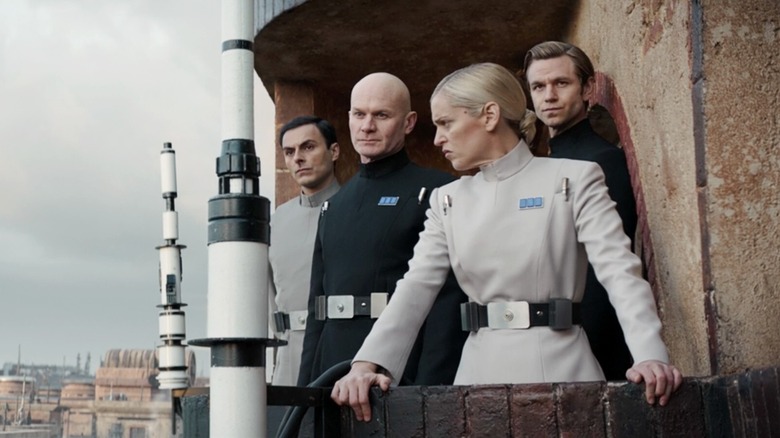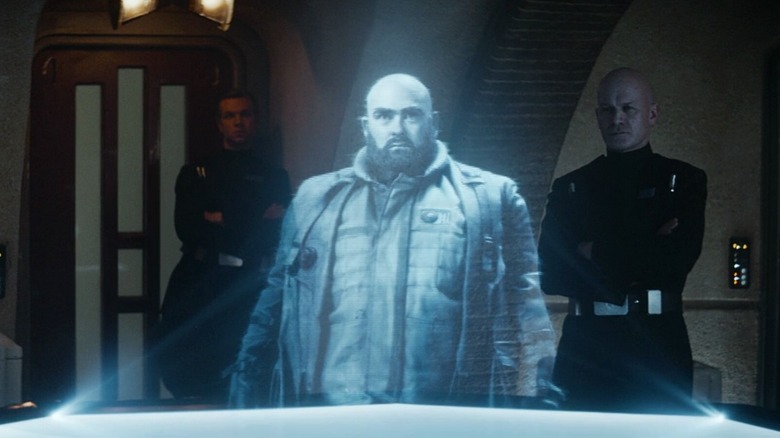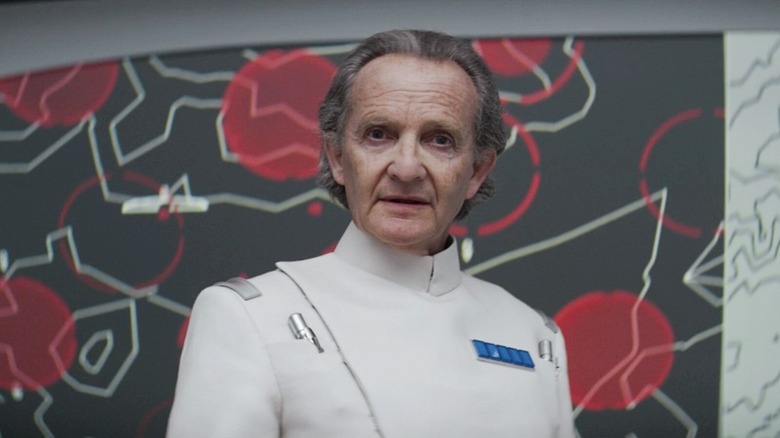Andor Episode 12 Skips Showing Us A Pivotal Battle, And The Finale Is All The Better For It
"Andor" has concluded its first season with a climactic and emotional finale, and with it came another set of unconventional choices (for a "Star Wars" series) that ended up making the show even better. Filled with key character moments and eerie parallels to the current political climate, episode 12 of "Andor" has no wasted space. Such is the importance of the pacing that a big battle teased and mentioned for the past couple of episodes is never even shown. Creator Tony Gilroy defies expectations until the end, sacrificing what could've been a drawn-out battle sequence to give the characters of "Andor" more room to breathe.
While this creative decision makes the finale have one less fight scene, it's all the better for it. "Andor" episode 12, like the rest of the season before it, is about how ordinary people rise up as rebels, and specifically about Cassian's journey and return to Ferrix. The emotional crux of the season hinges on his return to his home planet, and how the workers of Ferrix are moved to revolt against the Empire, so showing Kreegyr's fight could have taken away from the thematic resonance of the season finale, and the slow build towards violence. The unseen battle also returns to a technique the show has successfully used in the past: leaving what occurs to the viewer's imagination.
Kreegyr, we hardly knew ye
In the last two episodes of "Andor," Luthen's storyline centered around a decisive raid he was planning with a rebel militant named Anto Kreegyr. Luthen attempts to recruit Saw Gerrera to partner with Kreegyr to add to their numbers and increase the chances of success. However, when Luthen learns from Lonni Jung, his mole in the Imperial Security Bureau, that the Empire is aware of Kreegyr's planned attack, he keeps Saw from joining the fight. For all the talk about the pending conflict, viewers believed there was a chance to see the doomed-to-fail attack in action.
However, "Andor" episode 12 quickly puts any hope of seeing the attack happen to rest. In another ISB meeting, the Imperial officers crow about their victory in the one-sided battle and how Kreegyr's forces never stood a chance. The episode quickly moves on, but a point is made to show the price of Luthen's secrecy and self-preservation. When asked what he has personally sacrificed for the cause, Luthen replies:
"I've given up all chance at inner peace, I've made my mind a sunless space. I share my dreams with ghosts. I wake up every day to an equation I wrote 15 years ago from which there's only one conclusion: I'm damned for what I do ... I'm condemned to use the tools of my enemy to defeat them. I burn my decency for someone else's future. I burn my life, to make a sunrise that I know I'll never see."
Perhaps the entire point of Kreegyr and his machinations against the Empire was to demonstrate that rebellions demand "extremely difficult decisions under extreme circumstances." However, the fact that "Andor" doesn't even offer a glimpse of the aftermath of the battle arguably makes it more impactful. Like the unheard audio recordings used to torture Bix, some horrors are more powerful when left to the viewers' imagination.
Nobody's listening
Most important of all is the context in which we hear the results of the battle: a sanitized white conference room with high-ranking imperials that have likely never seen a fight. In a way, that feels more evil than anything that could've been shown to viewers — the willful ignorance on display, turning lives into numbers on a casualty report. The Empire's way of dehumanizing those whom they oppress became a running theme throughout each arc in the first season of "Andor." It makes sense that one of the last scenes at ISB headquarters features officials coldly talking about the battle instead of showing it.
"Andor" has prioritized its characters before everything else, since they are our entry point into the roots of the rebellion. The finale had its sights set squarely on Ferrix, with all of the action and emotional investment coming from that one location and tied to the characters we've already been introduced to. Another Rebels vs. Empire fight might've been entertaining, but "Andor" poured everything into its core climactic battle — grounded in the characters that have been developing for the past 11 episodes, rather than a character we've only ever seen in holographic picture form. The episode is a masterclass in exercising restraint so that when the fighting does happen, it hits harder than most of what we've seen in "Star Wars," making for an unforgettable finale.


